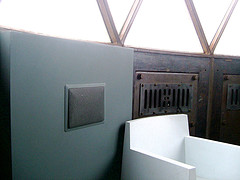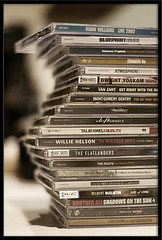31 December 02006
Be patient, it's a longplayer
 Another year is over, and today I made what is becoming my annual visit to the Longplayer 'listening post' at Trinity Buoy Wharf lighthouse. It seemed busier than New Year's Eve last year. The picture on the left was taken at lunchtime in the listening post at the top of the lighthouse — it shows one of the speakers for the music, and outside the window is the River Thames.
Another year is over, and today I made what is becoming my annual visit to the Longplayer 'listening post' at Trinity Buoy Wharf lighthouse. It seemed busier than New Year's Eve last year. The picture on the left was taken at lunchtime in the listening post at the top of the lighthouse — it shows one of the speakers for the music, and outside the window is the River Thames.
Longplayer is a piece of music that plays, without repetition, for a thousand years. Today is the seventh anniversary of the beginning of its continuous performance. There is more about the work in my accounts of my 02003 and 02005 visits. And more photos in my Longplayer set on Flickr. Listen to Longplayer in real time, and please make a donation to keep it playing, if you can.
Lucy is not well, so we won't be going out tonight. Many of the things we had hoped would have come to fruition by the end of this year are still in progress or up in the air. Longplayer is a consoling reminder that a year is a short time and that there is much to be said for being still and patient. Happy New Year!
30 December 02006
Quantity not quality: a year's worth of CDs and where they came from
I don't make a big deal about New Year's Resolutions, at least not in public. But I do aim to buy progressively fewer CDs each year. Five years ago, in 02001 and 02002, my 'habit' almost got out of hand: I was buying over 150 CDs a year. That's three a week; too many to digest the new acquisitions, let alone have time to enjoy the old albums in my collection. So I've been cutting down. Not that I'm withdrawing my patriotic (or whatever) support for the music industry, you understand. I spend much more on live music these days (as previously documented), and, since September, I've been signed up on eMusic's 40-tracks-for-£8.99 package — itself a good rationing discipline. I just don't want too many more CDs and records, thanks.
So for 02006 my records (unreliable but not drastically so) tell me I'm down to 68 new CDs and records. That's my lowest figure since 01999. However, I don't think the year-by-year comparison is a direct one any more, since I acquire CDs in different ways these days. I bought just 19 of the 68 myself from physical or online retailers; a few years ago the vast majority would have come via that route. Where did the others come from?
Continue reading "Quantity not quality: a year's worth of CDs and where they came from"18 December 02006
Blogs, wikis, 'voice' and accountability
In the course of writing my book, I started by describing blogs and wikis as two examples of the same thing — user-generated content. Towards the end of the book, I came up against the ways in which they are opposites: blogs reinforce individual voices, points of view and attitudes, while wikis efface this individuality and the accountability that comes with it.
Wikis have some advantages over blogs. Their design encourages users to aim for consensus, whereas the design of blogs encourages a kind of Tower-of-Babel cacophony. However, here I'm going to focus on one of the downsides of wikis. This is a philosophical piece that accompanies a more practical article over on my book blog.
Continue reading "Blogs, wikis, 'voice' and accountability"10 December 02006
Back in the blogging seat
After a couple of months of inactivity blog-wise, I'm returning to the scene, and hoping I haven't lost everyone who used to visit here.
I've actually been back in action since the beginning of the month, but mostly on other sites. Check my Net, Blogs and Rock'n'Roll blog for a couple of entries last week.
I've also set myself the task of more actively testing the water and trying to build my network on some of the music community sites. So you can find several posts about music on Last.fm, MOG, MyStrands and Vox (Vox isn't a music-specific community, but some think it could one day challenge MySpace). Yes, I've duplicated the same posts several times over on different sites. In this Web 2.0 age, that should be easier than it is, but each site has its own variant of pidgin HTML. Is it a bad idea to have the same material in different places? Let me know if you think it is. In the meantime, it's my content, and I'll do what I want with it.
This use of other outlets for writing about music will reduce what finds its way into the Cultural Calendar category of this blog. Though there will be a second in the series of unlikely CD reviews in a short while.
5 December 02006
Steven Johnson and Brian Eno at the ICA
Yesterday evening the ICA put on an event that was part book launch for Steven Johnson's new book, The Ghost Map (subtitle: A Street, an Epidemic and the Two Men Who Battled to Save Victorian London — these long 'pitch' subtitles are getting out of hand), and part first UK event for the Long Now Foundation. It was a similar kind of discussion to last year's Longplayer conversation.
As the sole non-US founder of the Long Now Foundation, Brian Eno started the discussion by outlining its short history. It was started ten years ago by ten people, including Stewart Brand and Danny Hillis (presumably the Board includes most if not all of the founders). The main aim is to 'dignify' long-term thinking. They have a set time frame of 10,000 years as the horizon for their projections. Projects include Long Bets, the Clock of the Long Now, and a series of talks in San Francisco available as a podcast.
Continue reading "Steven Johnson and Brian Eno at the ICA"
Subscribe to my RSS feed, which covers this blog, my book blog, and further commentary on other web resources (more feeds below)
Quantity not quality: a year's worth of CDs and where they came from
Blogs, wikis, 'voice' and accountability
Back in the blogging seat
Steven Johnson and Brian Eno at the ICA
Cinema (24)
Cultural Calendar (86)
Curatorial (66)
E-learning (102)
Events (35)
Future of Music (95)
Human-Computer Interaction (62)
Ideas and Essays (37)
Long Now (18)
Miscellany (44)
Music and Multimedia (157)
Playlists (27)
Podcasting (12)
Politics (12)
Radio (48)
Reviews (58)
Social Software (60)
Teaching (23)
Alternatively, see the Date-based Archives
Recommended: RSS feed that combines items on this site, my book blog, and commentary on other web resources
RSS feed for this site only
RSS feed for my book, Net, Blogs and Rock'n'Roll
RSS feed for shared bookmarks
My latest bookmarks (click 'read more' for commentary):
My archived bookmarks (02004-02008)
On most social sites I am either 'davidjennings' or 'djalchemi', for example: Flickr, Last.fm, Ma.gnolia and so on…
Lateral Action — managing creativity
Herd — social cognition
Seb Schmoller's e-learning mailings
Viridian Design Movement
Tom Phillips — artist
Long Now blog — resources for long-term thinking
Longplayer live stream — 1,000-year composition

The contents of this site are licensed under a Creative Commons Licence except where otherwise notified.
Hosted by Paul Makepeace
W3C Standards
Check whether this page is valid XHTML 1.0
Check whether the CSS (style sheet) is valid



